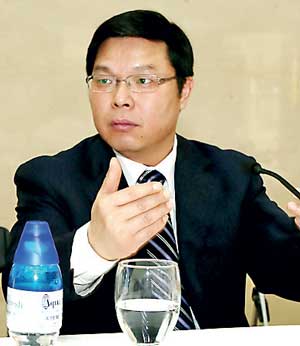Sunday Feb 22, 2026
Sunday Feb 22, 2026
Friday, 31 July 2015 00:50 - - {{hitsCtrl.values.hits}}
Chinese Ambassador Yi Xianliang was invited to attend a meeting presided over by Sri Lankan President Maithripala Sirisena at the Presidential Secretariat on Wednesday to discuss how to deal with Chronic Kidney Disease(CKD) with the participation of the heads of other Colombo-based diplomatic missions and representatives of international organisations. 
Ambassador Yi said that China had always supported Sri Lanka to improve the quality of its drinking water and deal with the CKD problem, and it had taken several other significant measures to help Sri Lanka in this avenue and would continue to do so.
During the past three years experts from the Chinese Academy of Science had visited Sri Lanka and studied the water quality in certain areas. An MoU was signed between the Chinese Academy of Science and the Ministry of Urban Development, Water Supply and Drainage of Sri Lanka when President Sirisena paid a state visit to China in March 2015.
Furthermore, with the support of preferential and commercial loans from China, Chinese companies have completed and are still constructing several water supply projects aimed at providing clean drinking water to the locals.
Additionally, China agreed to provide grant assistance to establish a kidney hospital at the request of the Sri Lankan Government during President Sirisena’s visited. Considering the local conditions, Ambassador Yi also suggested establishing clinics affiliated to the kidney hospital in some other districts. The two sides are talking about the possibility of establishing such clinics in the Uva and other provinces.
President Sirisena highly appreciated the efforts made by the Chinese, and asked the Ministries of Health and Urban Development and Drainage to maintain close communication with the Chinese side. The China Geo-Engineering Corporation (CGEC) has completed 18 urban water supply and drainage projects since 1994, which provide clean drinking water and a sewage disposal service to more than 30 cities and towns, and have employed over 20,000 local workers.